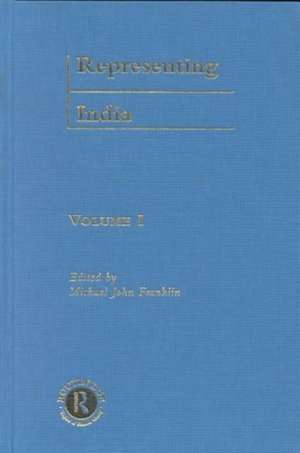Representing India: Indian Culture and Imperial Control in Eighteenth-Century British Orientalist Discourse: Colonial Encounters
Autor M. Franklin Editat de Michael Franklinen Limba Engleză Hardback – 31 oct 2000
* represent central documents in the emergence of modern Indology
* demonstrate how closely interwoven are the histories of Oriental scholarship and of British administrative policy contributions
* present the Orientalist side of the argument concerning the government of India to balance and oppose the Utilitarian and Anglicist bias implicit in James Mill's History of British India.
Preț: 12585.79 lei
Preț vechi: 15348.53 lei
-18% Nou
Puncte Express: 18879
Preț estimativ în valută:
2408.28€ • 2624.18$ • 2029.33£
2408.28€ • 2624.18$ • 2029.33£
Carte indisponibilă temporar
Doresc să fiu notificat când acest titlu va fi disponibil:
Se trimite...
Preluare comenzi: 021 569.72.76
Specificații
ISBN-13: 9780415222464
ISBN-10: 041522246X
Pagini: 4984
Dimensiuni: 156 x 234 mm
Greutate: 7.8 kg
Ediția:1
Editura: Routledge
Seria Colonial Encounters
ISBN-10: 041522246X
Pagini: 4984
Dimensiuni: 156 x 234 mm
Greutate: 7.8 kg
Ediția:1
Editura: Routledge
Seria Colonial Encounters
Cuprins
Volume I John Zephaniah Holwell Interesting Historical Events Relative to the Provinces of Bengal and the Empire of Industan [1765-67] Initially a surgeon on board an East Indiaman, Holwell eventually succeeded to the Governorship of Bengal for a brief period in 1760 before he left India. A survivor of the infamous Black Hole of Calcutta (on which he published a narrative account), Holwell was one of Voltaire's chief informants on India. This was a widely reviewed and influential text. Volumes II and III Alexander Dow The History of Hindustan, [1770-72] A Colonel in the East India Company's Bengal Army, Dow's views on moral, religious, and political questions were conventionally 'enlightened'; the Monthly Review claimed that he was better informed on Hinduism 'than any preceding writer'. Volume IV Nathaniel Brassey Halhed A Code of Gentoo Laws [1776] An Oxford friend of Sheridan and William Jones, Halhed was one of the most talented of Warren Hastings's proteges. He came to India with a substantial knowledge of Persian, and his work in translating Hindu law aroused an intense curiosity concerning Sanskrit, Hindu mythology and chronology. The code and its preface were well received in Europe and Halhed went on to publish the first English Grammar of the Bengal Language [1778], using a Bengal fount designed and manufactured by 'India's Caxton', Charles Wilkins. Jonathan Scott An Historical and Political View of the Decan, South of the Kistnah [1798] Scott was Hastings's Persian Translator, responsible for diplomatically sensitive communications. Hastings also valued Scott's historical investigations which took their cue from Robert Orme's thesis that the reign of Aurangzeb and of his successors was the key epoch of Mughal history. Scott concluded that a fuller understanding of recent history might be gained from an insight into the history of the Deccan. Scott, on his return to England, turned his hand to more popular literary Orientalism, becoming well-known for his new translation of the 'Arabian Nights', and vociferously protesting about the lack of patronage of Eastern literature extended by the 'Hon. India Company'. Volumes V and VI Francis Gladwin Ayeen Akbery: or, The Institutes of Emperor Akber [1800] The A'in-I Akbari formed a valuable guide to Mughal precedents for the Company's government. In commending Gladwin's translation, Hastings declared that 'every branch of Indian literature' should be added to 'the stock of European knowledge'. Volumes VII and VIII Asiatick Researches; or, Transactions of the Society Instituted in Bengal, for Inquiring into the History and Antiquities, the Arts, Sciences and Literature of Asia [1788] The official journal of the Asiatick Society of Bengal, in which the Society's founder-President surveys the field the journal would cover with the grande
